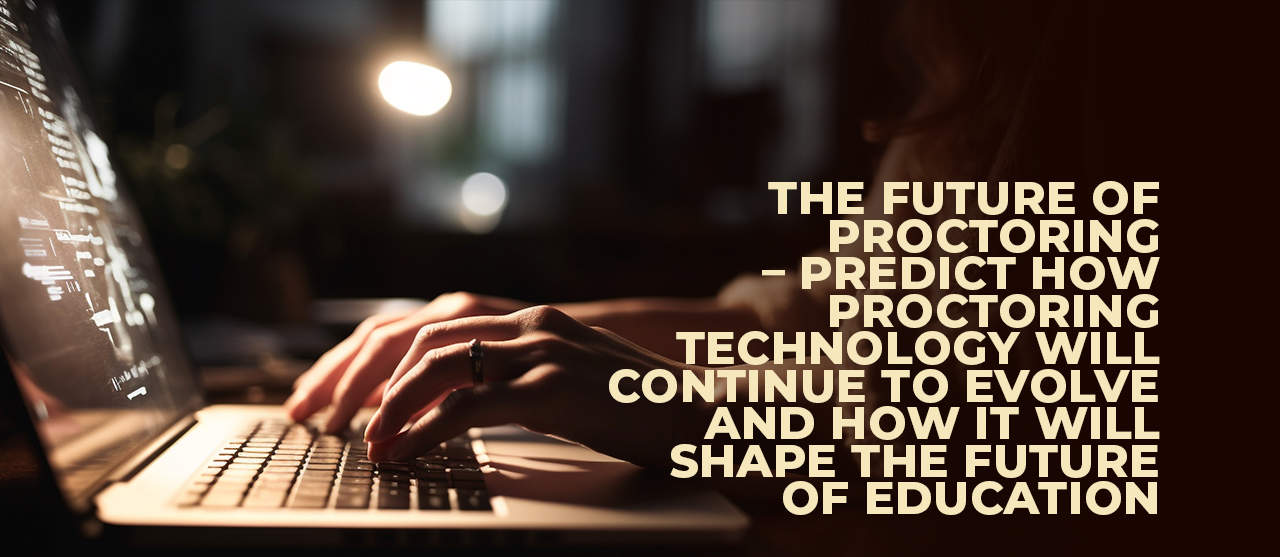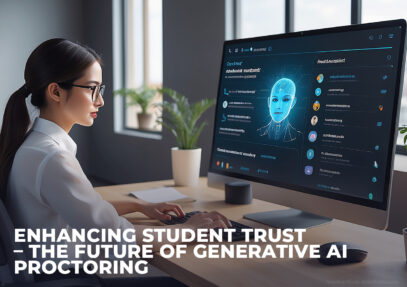
Proctoring, a time-honored practice for overseeing examinations, has long been key in ensuring a fair testing environment. As COVID-19 pushed e-learning into the spotlight in 2020, remote coursework surged, impacting over 1.6 billion students worldwide. This shift accelerated the growth of the e-learning market, which is projected to reach $1.74 billion by 2028. Amid this growth, proctoring technology has played a pivotal role and has a lot of promise to evolve further.
This article explores the potential advancements in proctoring, envisaging its profound influence on the future of education.
Proctoring Beyond Boundaries: The Rise Of Remote And Automated Solutions
The proctoring technology ecosystem is based on a continuum of systems that control and monitor the testing environment, from the creation of exams and course content to the protection of intellectual property and remediation services. These technologies are necessary to safeguard students from undue academic dishonesty or outright cheating during tests. In that light, emerging trends in proctoring technology include:
1. Artificial Intelligence (AI) And Machine Learning (ML) Integration
AI and ML are revolutionizing proctoring technology by enabling more sophisticated and accurate monitoring of online exams. These technologies can detect patterns of cheating behavior, such as eye movements or unusual clicks, and flag suspicious activities in real-time.
AI-powered algorithms can also assess the uniqueness of each student’s writing style to detect potential plagiarism. As the AI and ML landscape continues to advance, it’ll amp up the quality of proctoring services.
2. Advanced Behavior Monitoring And Analysis
Proctoring systems are evolving beyond basic video monitoring. Advanced behavior monitoring and analysis tools can capture and analyze a wide range of student actions during exams. This includes keystroke dynamics, mouse movements, gaze tracking, and even facial expressions.
By examining the behavioral patterns, proctoring systems can identify signs of stress, distraction, or cheating attempts. This comprehensive analysis provides valuable insights into student engagement and helps educators tailor their teaching approaches accordingly.
3. Record And Review Proctoring Systems
Record and review proctoring systems combine live monitoring with post-exam analysis. During an exam, human proctors observe students in real time to address any immediate issues or concerns. Simultaneously, the system records the entire examination process, including audio, video, and screen activity.
This recorded data allows educators and administrators to review exams after they conclude, offering a chance to re-evaluate flagged behaviors or potential instances of academic misconduct. Of course, this combination of real-time proctoring and post-exam review enhances the accuracy and integrity of the assessment process.
4. Live IT Support Proctoring System
Live IT support proctoring systems integrate technical assistance within the examination environment. When students encounter technical issues during the exam, they can instantly connect with IT support staff through chat or video conferencing. This real-time support minimizes disruptions and stress for students, ensuring a smoother exam experience.
Additionally, proctors can verify the authenticity of technical problems and determine if further investigation is necessary. Live IT support plays a crucial role in maintaining the credibility and reliability of online exams, fostering a positive learning environment.
All these trends point to one thing — a transformative shift in how education assessments are conducted and the significant role proctoring technology plays in that. The idea is to ensure the utmost academic integrity and foster a conducive learning environment for all students.
Predictions For Proctoring Technology’s Evolution In Education
According to an EDUCAUSE survey, 54% of institutions were already using online/remote proctoring in 2020, and 23% were considering it. The use of proctoring in education is rapidly evolving as the world becomes increasingly digital. Here’s a rundown of this evolution and what it means for the future of education:
1. Shifting Dynamics In Assessment And Evaluation
Proctoring technologies are changing the way that assessments are designed, delivered, and evaluated. For example, proctoring software can be used to create adaptive assessments that are tailored to each student’s individual needs. This can help to ensure that all students have an equal opportunity to demonstrate their knowledge and skills.
2. Addressing Concerns About Privacy And Data Security
The use of proctoring technologies raises concerns about privacy and data security. For example, some proctoring software collects biometric data, such as facial scans and keystroke patterns. This data could be used to track students’ online activity or to identify them for marketing purposes. It is crucial for educators to carefully consider the privacy implications of using proctoring technologies before implementing them.
3. Accessibility And Inclusivity Considerations
Proctoring technologies can pose challenges for students with disabilities or who are from disadvantaged backgrounds. For example, some proctoring software requires students to have access to a webcam and a high-speed internet connection. This can be a barrier for students who do not have these resources.
So, it is important for institutions to carefully consider the accessibility and inclusivity implications of using proctoring technologies — precisely where an expert technology partner can help in catering the proctoring solution per the needs of the students.
4. Ubiquitous Adoption Of AI-Powered Proctoring
AI-driven proctoring technology will become ubiquitous in educational institutions, ensuring the integrity of exams across various subjects and levels. As elucidated above, with real-time behavioral analysis and machine learning algorithms, proctoring systems can accurately detect cheating attempts, such as unauthorized device usage or collusion among students.
5. Blended Proctoring
Blended proctoring combines all of the single-approach solutions into one comprehensive solution. Proctoring technology companies (like EnFuse), take it a step further with advanced AI proctoring software and live proctors trained to support students during times of stress and anxiety.
Step Into The Future Of Proctoring With EnFuse
At EnFuse, we’re leading the proctoring evolution, offering reliable and secure proctoring services for educational institutions. With customizable options and a focus on candidate experience, we are committed to empowering education through innovative proctoring solutions. As the landscape evolves, we empower institutions to remain dedicated to upholding academic integrity and facilitating learning in the digital age. Get in touch with us to learn more.

















Comment